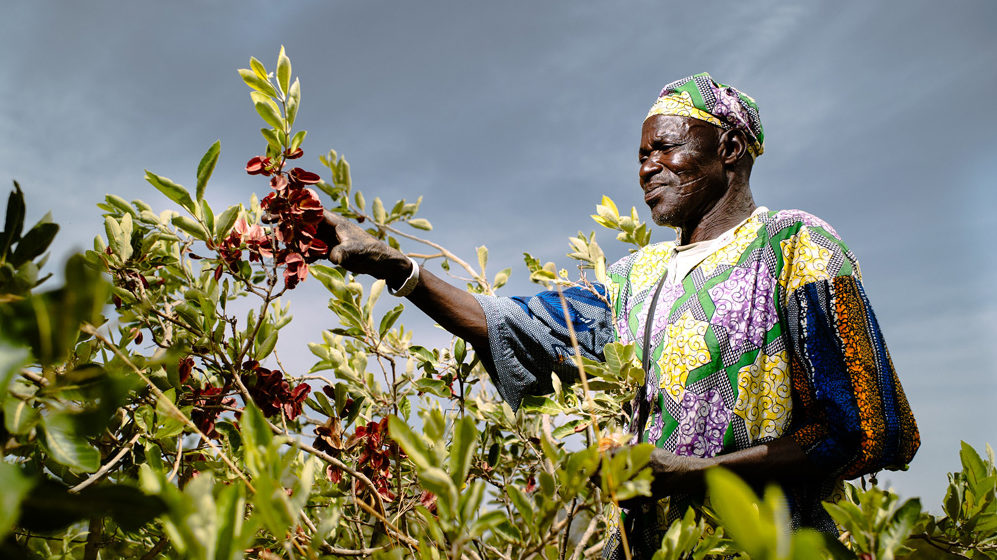In preparation for the first ever Food Systems Summit in September 2021, the UN member states have been asked to organize national dialogues to provide insight and to identify potential areas for development. In Sweden, a series of three global dialogues have discussed different topics and aspects of the transformation of food systems and what actions Sweden can take. This article highlights some of the issues and solutions raised in the third Swedish global dialogue.
The dialogue focused on identifying pathways to a nature-positive food production that contributes to increased food security while at the same time protects natural ecosystems, biodiversity and rehabilitates degraded landscapes and seascapes. There are several obstacles for this goal. Non-sustainable food systems are today responsible for approximately 80 percent of deforestation, and up to 29 percent of all greenhouse gas emissions. 34 percent of all land on the planet is used for agriculture; at the same time agriculture withdraws 70 percent of freshwater and is responsible for 68 percent of total biodiversity loss.
The food system elements – or in other words the food chain 2.0 – consist of food production, distribution and aggregating, food processing, marketing, markets and purchasing, preparation and consumption and, finally, resource and waste recovery that hopefully goes back into productive use. Farmers are the key stakeholders in this food system. Nearly 80 percent of Asian farmers are small-scale family farmers with two hectares of land on average. The situation in Africa is similar, but apart from the cultivated area, African small-scale farmers often have access to spare land for e.g. grazing livestock and finding firewood. The small-scale farmers and their family members are engaged in crops, livestock, fisheries, forestry, herding and/or pastoralism.
The current food system is resulting in poverty, hunger and malnutrition in those least able to defend themselves. The challenges of small-scale farmers are many, lack of land rights and other natural resources, access and control over technologies, finance and market resources, and weak market power and poor involvement in decision-making.
Other threats to sustainable small-scale production and improved diets include competition from cheap food from modern agriculture, highly processed food and the attraction of higher incomes from palm oil, cashew nuts and other cash crops
Degradation and deforestation
Mangrove ecosystems are important for preventing land degradation and erosion, but mangrove degradation is a major problem in coastal areas in tropical regions. In some areas the mangrove has been removed to create beaches. In Kenya, the increasing demand of biomass fuel in urban and peri-urban areas of coastal Kenya has contributed to the destruction of mangrove areas. This situation is made worse with the absolute poverty level of the communities who earn an income through such activities due to a lack of options. In coastal Kenya efforts are made to restore mangroves where locals are involved, and a scientific approach is used. The mangrove ecosystem is important for local food security and small scale fisheries.
Deforestation is the second largest contributor to climate change. Whilst Sweden is a leader in tackling climate change, Swedish food consumption has an impact on deforestation, biodiversity, water and livelihoods in Asia, Latin America and Africa. In Asia the main Swedish impact on deforestation comes from imports of oil seeds, in Latin America from beef and in Africa imports from other crops, spices, fruits and nuts. Swedish consumers must acknowledge that they are part of a global food system, and that the preferences in Sweden have effects elsewhere. There is a need to shift diets and reduce food waste in combination with paying more for sustainable products. It is also important to increase support for sustainable intensification and forest protection. The supplier chains should be improved with mandatory due diligence and multi-stakeholder fora.
What are the solutions?
There are no silver bullets to achieve sustainable food systems and to fulfil the human right to food. What is clear is that we need a holistic and inclusive approach for a food systems transformation. The food system needs to become productive and prosperous, equitable, empowering, resilient, regenerative, and healthy.
Game changing solutions would secure rights to land and natural resources, and make use of climate resilient and agroecological approaches. They would strengthen farmers’ cooperatives and enterprises to add value and increase small-scale farmers share of the market profit. Scientific and indigenous knowledge should be combined to close the knowledge gap in improving food systems.
Approximately 30,000 plants in the world are edible but only 7,000 have been used for food. 75 percent of our food originate from just nine plants. There are options available. Traditional food, such as aquatic mollusks from rivers, mangrove mud crab (Scylla serrate) and sago (starch extracted from tropical palm stems), must be encouraged. Transforming food systems into diversified agroecological systems will work towards at least 12 of the Sustainable Development Goals (SDG:s) including goal 1, No poverty, and goal 2, No hunger. This represents a new paradigm with changes in four aspects: production practices, social and economic relations, institutional framework and knowledge generation and transmission.
Solving global problems starts with dialogues and this dialogue added much knowledge in how to boost nature positive food production for people and planet. The dialogues continue all over the world and will be finalised with the UN World Food Systems Summit in September, but the real challenge will start after the summit. It is possible to transform our food systems, to fight hunger and achieve sustainable wellbeing in the whole world, what is needed is political will.
Reporting by Maria Larsson, Freelance Journalist
